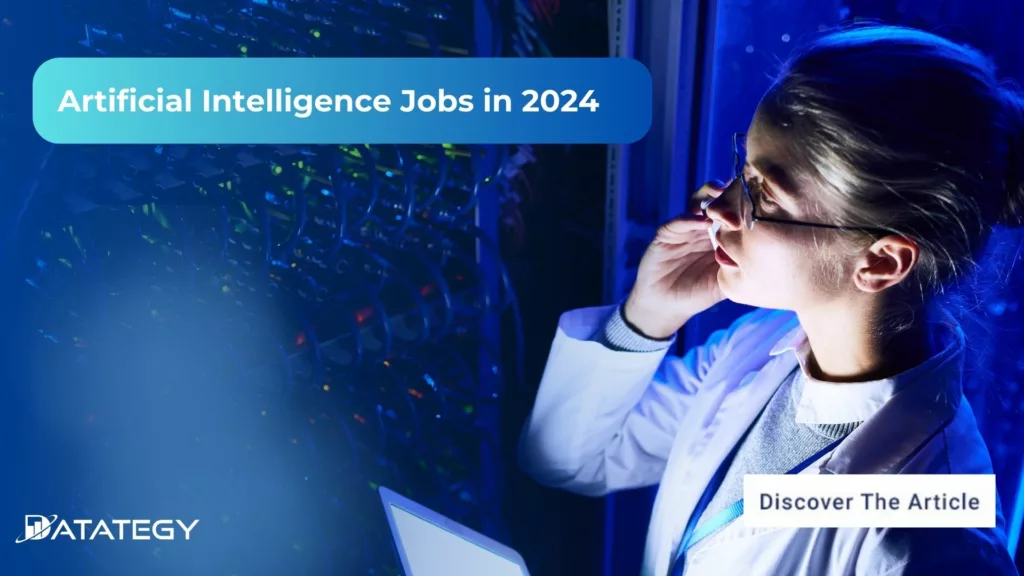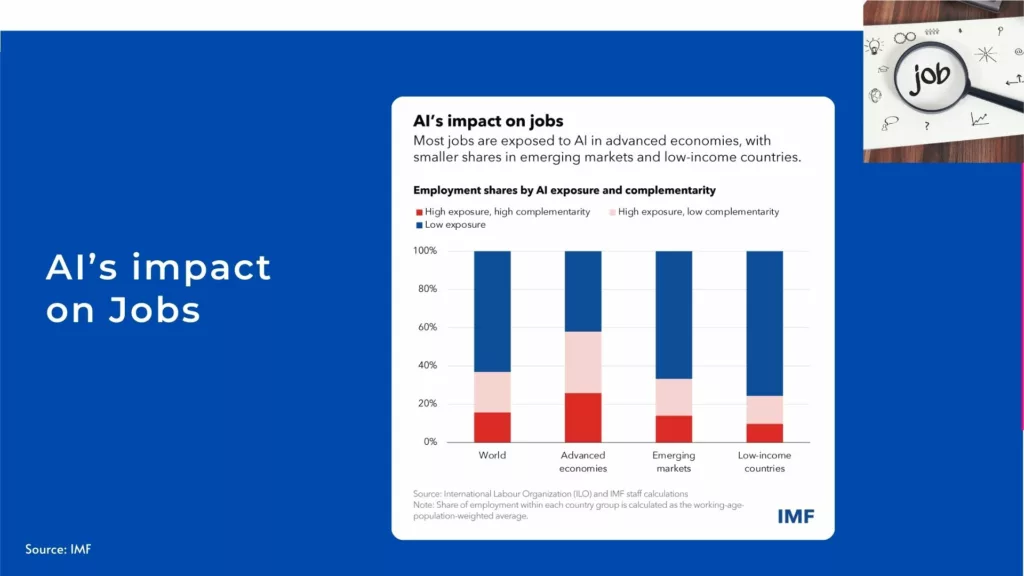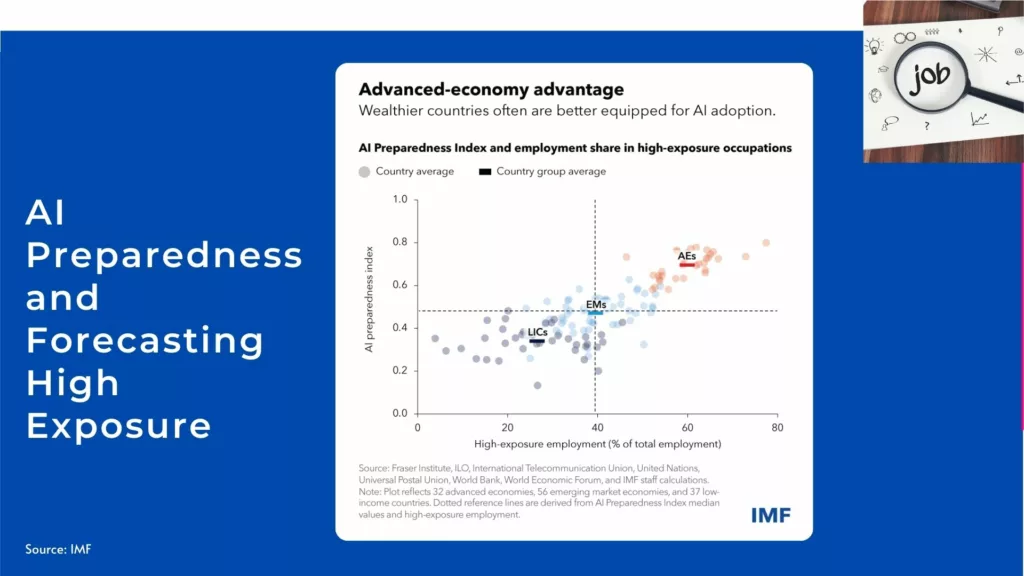How Law Firms Use RAG to Boost Legal Research RAG...
Read MoreArtificial Intelligence Jobs in 2024
Table of Contents
ToggleArtificial intelligence is one of the most disruptive technologies to emerge in the last two years. It is having an impact on the way companies work, but also on the way they recruit new colleagues.
According to a report by McKinsey Global Institute, there will be 85 million AI-related job openings by 2025, with 800 million jobs potentially requiring AI skills. The report also states that AI could increase global GDP by $13 trillion by 2030.
Find out how Datategy can improve the deployment of AI projects Within Your Organization here.

In this article, we explore the impact of artificial intelligence on the new hiring process and the types of jobs that will be most in demand in the field of artificial intelligence in 2024.
Introduction to Artificial Intelligence Careers
It is clear from navigating the complex world of AI employment that there is a growing need for qualified experts in this field. This section goes beyond the buzzwords to explain the importance of AI across a range of sectors, highlighting practical examples that demonstrate its disruptive potential.
The critical role artificial intelligence (AI) plays in tackling difficult problems, spurring innovation, and influencing the future will become clear to readers. This introduction offers a fascinating overview that piques interest and sets the stage for a deeper investigation of the varied and fulfilling careers within the field of artificial intelligence, regardless of the reader’s experience level or desire to move into the field.
What are the Different AI Disciplines?
Artificial intelligence (AI) is a multidisciplinary area that includes many different disciplines that all contribute to the creation and use of intelligent systems. Within the larger subject of AI, the following are some important disciplines:
Data Science: Data science is essential to the development of AI, even if it is not exclusive to AI. It entails using statistical techniques, machine learning, and data analysis to draw conclusions from both organized and unstructured data and to guide decision-making.
Machine Learning: The goal of machine learning (ML) is to develop algorithms that let computers learn from data and gradually get better at what they do without the need for explicit programming. Reinforcement learning, supervised learning, and unsupervised learning are all included.
Natural Language Processing (NLP): NLP is the study of how human language and computers interact. It allows robots to understand and produce writing that is similar to that of humans by tackling tasks like sentiment analysis, language production, and language interpretation.
Computer Vision: The field of computer vision focuses on making it possible for machines to perceive, analyse, and comprehend visual data from their environment. It encompasses activities including object detection, facial identification, and picture recognition, enabling
What impact will AI have on employment?
IMF staff members look at the possible effects of AI on the global labor market in a new report. Numerous studies have forecasted the possibility of AI replacing human labor. However, we also know that AI is likely to support human labor in many situations. Both of these dynamics are captured in the IMF study.
The results are surprising: AI is used in over 40% of jobs worldwide. Automation and information technology have always influenced repetitive work, but artificial intelligence (AI) stands out for its capacity to disrupt highly skilled occupations.
Therefore, compared to emerging markets and developing countries, established economies face more dangers from AI but also have more opportunities to take use of its advantages.

For instance, factors like years of education and job-market mobility are assessed in the human-capital and labor-market policy component, along with the percentage of the population that is protected by social safety nets.
The regulatory and ethics component evaluates how well a nation’s legal system can adapt to digital business models and if robust governance is in place to ensure efficient enforcement.
IMF personnel evaluated 125 nations’ preparedness using the indicator. The results show that, although there is significant regional variation, wealthier economies—including developed and some emerging market economies—tend to be more prepared for the adoption of AI than low-income countries.
Based on their excellent performance in each of the four areas that were monitored, Singapore, the US, and Denmark had the highest index ratings.

What are the most in-demand AI Jobs in 2024?
1- Data-Driven Roles
Data Scientist
Data scientists are the alchemists of today, transforming raw data into a wealth of insightful knowledge. Equipped with programming skills and statistical knowledge, they sift through intricate databases to identify important patterns and trends.
Through the conversion of data into usable insight, data scientists revolutionize organizations, whether they are analyzing customer behavior, forecasting market trends, or optimizing operational efficiency.
Beyond just crunching numbers, they also create narratives that enable organizations to lead innovation, make well-informed decisions, and maintain an advantage over competitors.
The average salary for a Data Scientist: €85,000/Year.
Machine Learning Engineer
The designers of intelligent systems, machine learning engineers give algorithms a life of their own and enable them to adapt and learn. having a strong grasp of programming languages, mathematics, and domain-specific expertise, they create and use machine learning models.
Machine Learning Engineers impact the future of AI applications by building predictive models for complicated issue-solving and recommendation engines for personalized user experiences.
Their work is at the cutting edge of innovation, advancing diagnostics in healthcare, autonomous vehicles, and many other fields where wise decision-making is critical.
The average salary for a Machine Learning Engineer: €75,000/Year.
Data Analyst
Translating unstructured data into meaningful business points, data analysts are the translators of the digital world. They meticulously go through data to find trends, patterns, and insights using their strong statistical analytic skills and acute eye for detail.
Providers of useful information to stakeholders, and data analysts are essential in supporting decision-making procedures.
They undertake the essential job in giving organizations the information they need to promote efficiency and strategic growth, whether they are monitoring key performance indicators, evaluating the success of marketing efforts, or streamlining operational procedures.
Businesses may make decisions based on well-informed, thoroughly examined data when data analysts act as a link between data and decision-making.
The average salary for a Data Analyst: €65,000/Year.
2- Research and Development
AI Research Scientist
The leaders in scientific research in the field of artificial intelligence are known as AI research scientists.
Coupled with an extensive understanding of theoretical frameworks, mathematical models, and computational approaches, they set out to push the boundaries of artificial intelligence.
AI Research Scientists explore unexplored areas using creative problem-solving and rigorous testing in an effort to make breakthroughs that expand the potential of intelligent systems. Their work, which seeks to understand AI better and advance the subject into new areas of application, is based on a strong dedication to theoretical rigor.
The average salary for an AI Research Scientist: €89,000/Year.
Research Engineer (AI)
AI research engineers are an example of the synthesis of theoretical understanding with real-world application.
They close the gap between abstract ideas and practical implementations by becoming experts in algorithms, machine learning models, and coding. When it comes to converting cutting-edge research into useful technology, research engineers are essential.
Through the creation of prototypes, algorithm optimization, and model refinement, they help to ensure that the latest developments in AI are seamlessly incorporated into workable solutions.
Research engineers are the backbone of the iterative process that takes artificial intelligence from theoretical concepts to practical implementations. They are committed to scientific principles.
The average salary for a Research Engineer: €82,000/Year.
Research Scientist (Machine Learning)
As the developers of algorithmic innovation, research scientists with a focus on machine learning navigate the complex world of statistical models and computational techniques. Driven by an unquenchable curiosity, they explore the subtleties of machine learning in an effort to unearth cutting-edge methods that will revolutionize the industry.
Armed with a profound comprehension of data patterns and computational intricacies, machine learning research scientists carry out groundbreaking experiments that test the limits of predictive modeling.
Their dedication to scientific rigor is evident in their work, which aims to disentangle the fundamental laws governing machine learning systems and open the door for revolutionary developments in artificial intelligence.
The average salary for a Research Scientist: €80,000/Year.
Computer Vision Engineer
A computer vision engineer is a person who works at the intersection of applied technology and mathematical abstraction in the field of artificial intelligence (AI).
Backed with an in-depth knowledge of computer science, machine learning, and image processing techniques, these engineers set out on a scientific quest to allow robots to read and grasp visual data.
They create algorithms that enable AI systems to analyze, interpret, and extract valuable insights from visual data with an accuracy that is comparable to that of the human visual system. Whether it’s improving autonomous car perception, face recognition technology advancement, or interpreting complex patterns in medical pictures.
The average salary for a Computer Vision Engineer: €83,000/Year.
3- Strategic Management and Implementation
AI Product Manager
When it comes to coordinating artificial intelligence (AI) projects, the AI Product Manager takes on the role of the strategic conductor, balancing commercial goals with technological complexities.
Having a comprehension of AI concepts and business dynamics, they adeptly manage the intricate equilibrium between inventiveness and pragmatic application.
AI Product Managers carefully select the course of AI products via a scientific lens, making sure that they are in line with company objectives. They lead cross-functional teams to deliver complex AI solutions from inception to reality, therefore their work requires a blend of technical acuity and business savvy.
The average salary for an AI Product Manager: €100,000/Year.
AI Project Manager
AI project managers are the scientific architects of project landscapes; they successfully guide AI projects through a logical process. Equipped with an organized methodology, they employ scientific project management techniques to supervise the complexities involved in the creation of AI.
AI project managers ensure that AI initiatives are integrated into organizational frameworks seamlessly by having a keen awareness of resource allocation, risk mitigation, and timetable management.
They negotiate uncertainty in the scientific domain of project management, encouraging cross-disciplinary teamwork to convert abstract AI frameworks into concrete, useful solutions.
The average salary for an AI Project Manager: €95,000/Year.
Product Owner (AI)
The Product Owner (AI), who oversees AI product development, works at the nexus of practical application and scientific vision. With an in-depth comprehension of AI capabilities, they clearly and scientifically state the exact needs of the product.
Product Owners in the context of Agile techniques support the iterative development of AI solutions, making sure that every iteration of development is in line with market expectations and scientific principles.
Through close collaboration with cross-functional teams, Product Owners steer AI solutions through a scientifically guided route from conception to market success by striking a balance between technological feasibility and business value.
The average salary for a Product Owner: €88,000/Year.

The expertise of AI and Data Science professionals has become synonymous with the fuel that powers our innovation engine.
Eric Chau
CTO-Datategy
How does Datategy Support New Careers in AI and Data science?
One of the first companies in the AI and data science fields, Datategy, has developed a program to assist all AI enthusiasts in starting their first careers.
For any recent graduate, starting a profession is an important step since it represents a fresh start and new challenges.
In addition to providing assistance to recent graduates and students in obtaining their first professional experience, the “Datategy Early Careers Program” instills initiative and teamwork as essential principles for success.

At Datategy, we provide you with the chance to embark on a human adventure with the goal of becoming the greatest version of yourself in order to develop and advance your abilities.
The resources you need to choose your own path and manage your professional development will be provided. Supervisors with experience and knowledge in data science and machine learning will support you.
We are seeking creative thinkers who are receptive to new perspectives and distributive innovation. People who can appreciate artificial intelligence, grasp its potential, and recognize the good effects AI may have on society are what we are looking for. You can discover more here.
Interested in discovering papAI?
Our AI expert team is at your disposal for any questions
How RAG Systems Improve Public Sector Management
How RAG Systems Improve Public Sector Management The most important...
Read MoreScaling RAG Systems in Financial Organizations
Scaling RAG Systems in Financial Organizations Artificial intelligence has emerged...
Read MoreHow AgenticAI is Transforming Sales and Marketing Strategies
How AgenticAI is Transforming Sales and Marketing Strategies Agentic AI...
Read More


